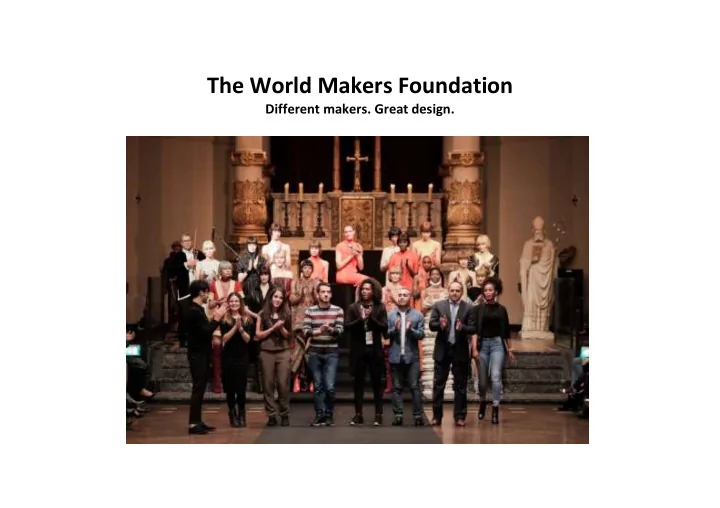

The World Makers Foundation Different makers. Great design.
How it started In 2017 fashion designer Karim Adduchi decided to make his new collection, She Has 99 Names , together with refugees & migrants, people whose art doesn’t often find its way to the catwalk. He met Ann Cassano and Atusa Lalizadeh, both experienced in supporting statusholders in the Netherlands. They worked together and involved Syrian, Russian and Eritrean artisans with knowledge of tailoring and embroidery. Moroccan migrant women , whose embroidery work is often confined to the home, embroidered a dress for the show. The collection was been featured prominently in the (inter)national press . Also, Adduchi has been selected by Forbes Europe and Forbes Middle East in their list of 30 Under 30 To Watch 2018 and has been awarded the Amsterdam Culture Business Award 2018. This was the beginning of The World Maker Foundation, an initiative to assist refugee and migrant artisans.
Adduchi: ‘It was a varied group of people. We had a Syrian tailor cutting patterns at one table, five Moroccan women, embroidering and chatting at another table, a half-dressed model being fitted in the middle. It was a culture shock all around. Still, people returned. One Moroccan granny cooked chicken tajine for all of us, which we ate standing between the fabrics. ’
Syrian coupeur Najib drawing a pattern on an antique Amazigh carpet. The carpet dress is now acquired by the Tropenmuseum .
Aleppo woodcarver Yaser Najjar made the pedestal shoes, designed by Adduchi. They’ve been acquired by the Tropenmuseum Amsterdam . Another pair is exhibited at the current exhibition of the Musée des Arts Décoratifs.
Vision The World Makers Foundation as an agent of change, creating quality with and opportunity for hidden artisans, improving the ecosystem in which they work to support them optimally. Mission We offer a platform to newcomer artisans whose skills remain invisible, and guide them through training and networking to an independent career. We want to reclaim & highlight the hidden heritage present in the city, connect traditional crafts to contemporary techniques By making together provide an opportunity to forge connections between groups living in the same city, but who don’t meet due to social and cultural distance.
Moroccan embroidery has remained largely undiscovered, despite being one of the most vibrant arts in North Africa for many centuries. This essentially feminine art was passed on from mother to daughter. Migrant women in their 50s still possess these embroidery skills. In our project migrant women are the teachers, not the ones in need of ‘empowerment’. They teach designers as well as other migrant women the various stitches (left), such as the complex, geometrical Fez-stitch (above).
Next to being teachers, women learn from and work with professional designers.
Our dream We want to build a structural & sustainable network to connect established artists with the hidden strands of cultural heritage & artisanship. By doing so we want to provide opportunities to forgotten artisans, be they refugee, migrant or Dutch. Our goals - Produce high-quality art & fashion together with forgotten artisans. - Highlight the hidden cultural heritage in the city. - Connect strands of artisanship from various socio-cultural backgrounds in the city. - Provide a platform for the stories of the invisible makers who carried their heritage to this city. - Achieve this through a radically participative process, using Deep Democracy and designthinking - Within 5 years: o Min 100 artisans as members o National recognition o EU attention Our values - Democratic - Innovative - Sustainable - High quality - Mending fissures in (social) fabric - Inclusion demands having the difficult conversations
The World Makers are Board of Directors: Natalya Johnson – chair Shadi AlHakimi – treasurer Atusa Lalizadeh - secretary Director Ann Cassano Board of Advisors: Karim Adduchi – Studio Karim Adduchi Lipika Bansal - Textielfactorij Mbarka N’bir – Stichting Aminah Et Al.
SWOT Strengths - Extensive network: local and European organisations, academics, facilitators, designers and cultural institutions - Flexibility: we can do projects in various crafts combined with various designers - Founders have extensive experience in working with newcomers - Open to statusholders, but also migrants and vulnerable women - Ambassador is Karim Adduchi, a designer with an international reputation - Various skills: designthinking, conflict resolution, facilitation - We work in the neighbourhood, with a low threshold, an initial focus on building rapport - We’ re agents of change: we address the ecosystem around the makers, reducing red tape. Weaknesses - Lack of cohesive internal organization - Starting with limited financial resources - Limited infrastructure (workspaces, tools) and human resources Opportunities - More appreciation for artisanship - Growth of circular economy: more attention for mending and repairing - Slow fashion is in, fast fashion is out - Western fashion is limited: women with non-western heritage want design with non-western elements - Newcomer artisans need support in becoming entrepreneurs - Existing networks for artisans are not accessible for new makers Threats - Materials and production costs are high in the Netherlands - Red tape for refugee-entrepreneurs - Lack of structural funding - Short-term status for refugee-entrepreneurs complicates the possibilities - Products which sell in country of origin don’t work on Dutch market
Strategic plan 2020-2021 - Project Social Couture: o designer Karim Adduchi will make his 2020 collection in cooperation with newcomer artisans and migrant women. o Fashion show in Amsterdam Museum, July 2020 o Exhibition in Hotel Europe and Bijenkorf o Funded by AFK - Developing product prototypes made by migrant/ refugee artisans - Make one embroidered haute couture dress from start to finish with migrant women (training) - Mapping migrated artisan heritage, developing workshops for Dutch designers - Supporting two artisan – entrepreneurs with their start-up - 2 workshops with stakeholders to improve ecosystem for refugee / migrant entrepreneurs - Research partner organisations for education and training for artisans - Obtain funding, sponsorships and atelier location
Recommend
More recommend